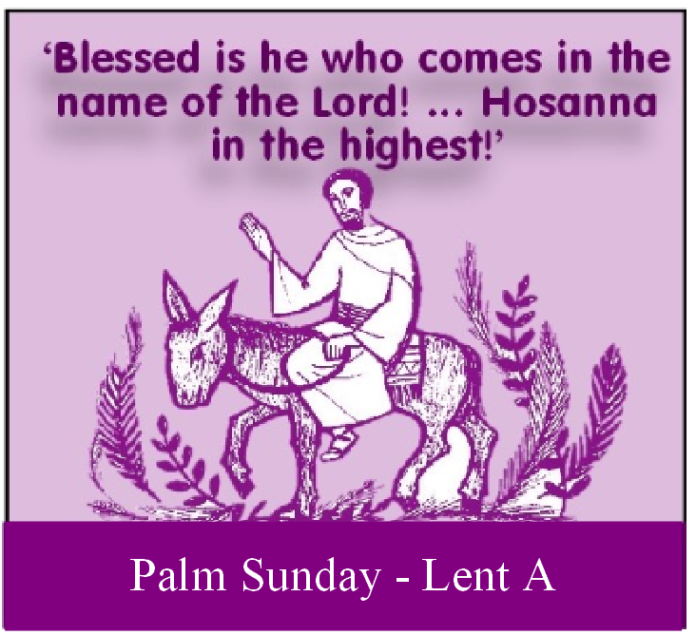Readings: Isaiah 50:4-7; Philippians 2:6-11; Matthew 26:14-27:6
Theme: ‘There was a shout about my ears and palms before my feet’ (G.K. Chesterton).
Today, Palm [Passion] Sunday, marks the beginning of Holy Week, the final phase of our Lenten preparation for the great feast of Easter. This is the only Sunday on which two Gospels are proclaimed. The first, during the procession with palms, is taken from Matthew’s gospel and recounts Jesus’ entry into Jerusalem, riding on a donkey to launch the final stage of his mission. He is greeted joyfully by the crowds, who, spreading their garments and palm branches on the road before him, acclaim him with the words: ‘Hosanna to the Son of David! Blessed is he who comes in the name of the Lord! Hosanna in the highest (Mt 21:10). These are the same crowds who will, a few days later, shout out in unison, ‘Let him be crucified!’ (Mt 27:22).
During the Liturgy of the Word, the events of Jesus’ passion are proclaimed in full, this year from the gospel of Matthew. These same events will be proclaimed again on Good Friday from John’s gospel. We may wonder why the Church gives such a central place in its liturgy to recalling, in all their gory details, the humiliation and crucifixion of the one who was Love Incarnate, the one who came on earth only to bring healing, forgiveness and peace? Surely not because this was the price demanded by the Father for our sins. Only a sadist would demand such a price, and God, far from being a sadist, is Love itself. Nor did Jesus go out of his way to bring about his violent end. He did not seek the Cross. However, he did embrace it freely as he discerned that the inevitable outcome of his mission of love would involve being handed over to his enemies and put to death.
Jesus’ suffering and death shows us with startling clarity what happens to self-forgetful love in a world ruled by the demons of hatred and violence. Jesus might have avoided the Cross, but only by turning aside from his mission of proclaiming and inaugurating the God’s reign of justice, peace and love. And this he could not and would not do. To reveal the full extent of God’s love for us, he had to endure suffering and death. The events we recall today represent the final phase and climax of Jesus’ life-giving mission of love and they reveal, as the fourth Eucharistic prayer reminds us, ‘how perfect his love was’.
Mel Gibson, in his famous 2004 movie, The Passion of the Christ, highlights the passion – the horrific suffering – endured by Jesus during the final twelve hours of his life. Yet, despite it lenghty and detailed portrayal of the violence inflicted on Jesus, Gibson’s movie is not a true representation of his passion. Jesus’ suffering and death on the Cross cannot be understood apart from the context of his passionate life, lived in obedience to the will of his Father, and poured out in loving service of others, especially the poor and marginalised: proclaiming a message of hope to those longing for liberation, healing of the sick, forgiving sinners, and casting out demons.
We recall the death of Jesus not as an arbitrary act of gratuitous violence but rather as the supreme manifestation of a life of love – the love of one who, as our second reading today reminds us, ‘did not cling to his equality with God but emptied himself to assume the condition of a slave’ (Phil. 2: 6 -7). In the first phase of his mission, Jesus was actively implementing his mission of proclaiming and witnessing to the reign of God. Now, in this final phase of his life, he is the one being acted upon. We see him being betrayed, arrested, imprisoned, interrogated by Caiphas, Herod and Pilate, scourged, crowned with thorns, mocked, forced to carry a cross, stripped of his garments, and finally nailed and hung on the cross until he expired. But this is not the end but rather the climax of his mission of loving service.
The Cross, as the noted Dominican theologian, Herbert McCabe, reminds us, reveals ‘the weakness of God…, not the weakness of ineffectiveness but the weakness of love, which is our best picture of the power of God. From creation itself right through to redemption the power of God is exercised not in manipulating and interfering with things but in letting them be, because the power of God is the power of love’. It is, however, only through the lens of the resurrection that we come to see the weakness of divine love in our world, not as a tragic defeat, but as a glorious victory. To quote again from that wonderful hymn in our second reading: ‘But God raised him high and gave him the name which is above all other names, so that all beings in the heavens, on earth and in the underworld… should acclaim Jesus as Lord, to the glory of God the Father’ (Phil. 2: 9 -11)
As we prayerfully recall the memory of Jesus’ passion and death, we profess our gratitude for the love that allowed Jesus to be ‘led like an innocent lamb to the slaughter’. We express our solidarity with all the victims of violence in our world today: the people of Ukraine, Syria, Afghanistan, Yemen, South Sudan, Nigeria, and many other countries. And we pray that, like Jesus, we may be active witnesses to his transforming love in our violent world.
Michael McCabe SMA.
To listen to an alternative Homily for this Sunday, from Fr Tom Casey of the SMA Media Centre, Ndola, Zambia please click on the play button below.
|
|

